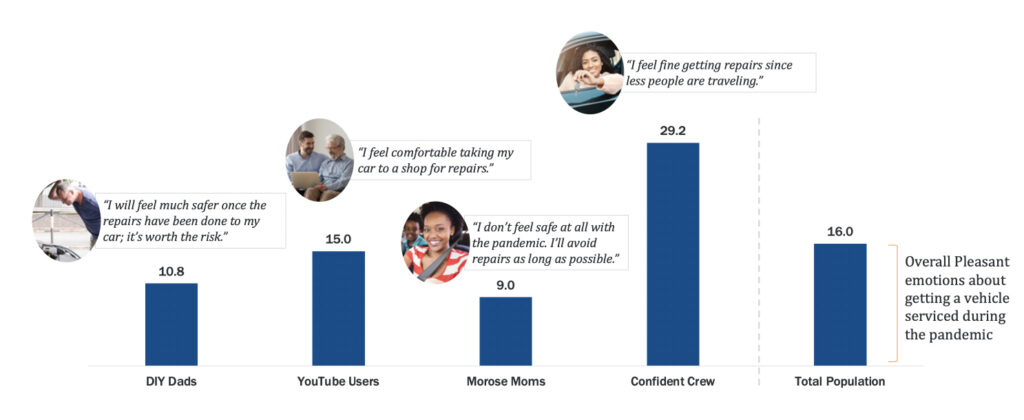Findings provide future vehicle miles traveled data, an in-depth look at consumer expectations and market segmentation analysis
DETROIT — While automotive aftermarket companies, suppliers, distributors and industry professionals all try to discern their path forward in a quickly evolving landscape, a newly released study shows U.S. adults plan to drive more overall post-pandemic. “Post-pandemic” for this study is described as when vaccines are widely distributed. This could mean significant industry growth in the near future.
The nationwide study, published by global market research firm The Martec Group, documents on average a 17% increase in overall vehicle miles traveled (VMT) post-pandemic. Across all categories (household and business), respondents expect to drive more post-pandemic than before the COVID-19 pandemic. Reasons for the increase include pent-up demand for travel and activities; additionally, many people moved during the pandemic with more than one-third moving farther away from work.
“As we’ve seen through our own research and in multiple other studies, the shift to remote work is not going away,” said study author Chuck Bean, Martec Partner/CMO. “However, we expect usage and ownership of personal vehicles to increase. In our study, a high percentage of respondents living in urban locations reported being likely to move to a suburban or rural location due to the pandemic.”
Shifting population data along with increased VMT insights suggest the automotive aftermarket is about to experience substantial growth. The pandemic also has impacted how people maintain or service their vehicles as well as their buying behaviors for vehicles, services and parts.
The pandemic has caused many consumers to delay purchasing or leasing a new vehicle. More than half of these consumers do not expect to do so until the second half of 2021, increasing average vehicle age. In addition, the majority of respondents have deferred vehicle maintenance during the pandemic. As consumers defer maintenance and push off getting newer vehicles, these factors likely will accelerate demand for parts and services in the aftermarket.
Segmentation Analysis
The study identified four key segments that were developed using the Martec Emotion Scores (MES)* to understand how consumers feel about maintaining or servicing their vehicles. Below is a snapshot of how each segment feels about servicing their vehicles during the pandemic:

Report Summary
This study explores data collected from a November 2020 survey of 1,000 respondents across the United States. For this survey, Martec intentionally captured vehicle owners and people who are primarily full-time employed. The goal of this survey was to develop foundational insights based on a nationally stratified sample. These results can be compared to the findings developed for specific organizations in order to understand how their customer base differs from the overall environment and what actions should be considered to capitalize on insights.
The report provides an in-depth look at consumer expectations and market analysis findings for the automotive aftermarket industry throughout the COVID-19 pandemic. Martec’s “Auto Aftermarket: Effects of COVID-19” report includes VMT data, vehicle usage details, figures on unperformed maintenance, aftermarket opportunities and DIY market share trends. The majority of the segments outlined in the report are becoming increasingly DIY-focused — pointing toward a continued rise in retail and e-tail channels and DIY repairs.
“Each consumer segment is approaching vehicle care differently,” said study author Emily Bielak, Martec project manager. “To succeed in capturing more market share, aftermarket suppliers and distributors need to take note of DIY [do it yourself] and IIFM [install if for me] trends detailed in our report. Trends like buying parts online versus in-store likely will continue. We can examine what that means for specific value chains.”
The report is available for purchase from Martec. To view key findings, the table of contents and contacts, visit info.martecgroup.com/automotive-aftermarket-report-covid-impacts.
This study was sponsored by DRiV and Gates and supported by the Auto Care Association.
*The Martec Emotion Score (MES) is calculated by plotting conscious and nonconscious emotions on a spectrum of unpleasant to pleasant, adjusted for relative intensity of feelings or passion level. The MES is ultimately a number between -100 (totally unpleasant) and +100 (totally pleasant). An MES close to 0 indicates a significant presence of both pleasant and unpleasant emotions.
The Martec Group is a global market research firm headquartered in North America with offices in Chicago, Detroit, Frankfurt (Germany), and Shanghai (China). For nearly 40 years, Martec has been providing unparalleled quantitative and qualitative research to top companies worldwide. Learn more at martecgroup.com.




